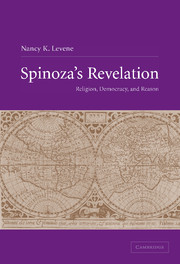Book contents
- Frontmatter
- Contents
- Preface
- Acknowledgments
- List of abbreviations
- Introduction
- 1 Vera religio
- 2 Spinoza's Bible: Concerning how it is that “Scripture, insofar as it contains the word of God, has come down to us uncorrupted”
- 3 Politics, law, and the multitude
- 4 Reason, revelation, and the case of the Hebrews
- Conclusion
- Bibliography
- Index
4 - Reason, revelation, and the case of the Hebrews
Published online by Cambridge University Press: 22 September 2009
- Frontmatter
- Contents
- Preface
- Acknowledgments
- List of abbreviations
- Introduction
- 1 Vera religio
- 2 Spinoza's Bible: Concerning how it is that “Scripture, insofar as it contains the word of God, has come down to us uncorrupted”
- 3 Politics, law, and the multitude
- 4 Reason, revelation, and the case of the Hebrews
- Conclusion
- Bibliography
- Index
Summary
[W]hether we consider religion to be revealed by the natural light or by prophecy; the proof applies in all cases, since religion is the same and equally revealed by God in whatever way we suppose men have come to know it.
(TTP, 220)[W]e must concede without qualification that the divine law began from the time when men by express covenant promised to obey God in all things, thereby surrendering, as it were, their natural freedom and transferring their right to God in the manner we described in speaking of the civil state.
(TTP, 188)The pacts
Despite Spinoza's rigorous argument for the rational ends of the democratic state, there are at least two conceptual dilemmas in his notion of its origins that have bothered most recent readers of the TTP, especially those reading it with the TP in mind. First, if human beings are so powerless individually, if in fact, as Spinoza seems to suggest, power itself (and thus natural right) does not preexist some form of sociality, what sense can a conception of a contract (pactum) have? This is not the question of whether the state of nature could actually have existed (historically), but simply a problem with the explanatory power of the model, its ability, in other words, to account for the rights that people possess in the social body, as it does in Hobbes.
- Type
- Chapter
- Information
- Spinoza's RevelationReligion, Democracy, and Reason, pp. 189 - 233Publisher: Cambridge University PressPrint publication year: 2004



